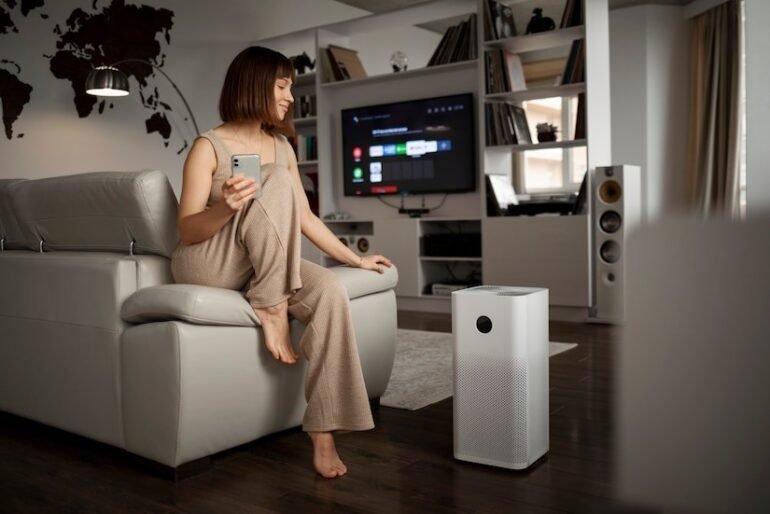Ensuring the air quality in your home is as important as choosing the right furniture or decor. With increasing pollution levels and allergens in the environment, investing in the best air purifier for home can significantly impact your health and well-being.
Air purifiers are designed to remove contaminants from the air, making it cleaner and healthier to breathe. Whether you’re dealing with dust, pet dander, pollen, or smoke, an air purifier system can help reduce the presence of these pollutants. For individuals with allergies or respiratory conditions, having an effective air purifier at home is not just a luxury but a necessity. This guide will walk you through the essential factors to consider when selecting an air purifier system to keep your indoor air fresh and clean.
Benefits of Using an Air Purifier for Home
Using an air purifier for home offers a range of benefits that can significantly enhance your indoor environment. Here are some key advantages:
Improves Air Quality
The home air purifier is engineered to improve indoor air quality by effectively targeting and eliminating a wide range of airborne particles and pollutants, such as:
Dust: Dust particles can settle on surfaces and contribute to respiratory issues. Air purifiers trap dust, preventing it from circulating and reducing the overall dust load in the air.
Pollen: Pollen, especially during certain seasons, can trigger allergic reactions. Air purifiers with HEPA filters capture these tiny pollen grains, reducing their presence and minimising allergic responses.
Pet Dander: For pet owners, dander from cats, dogs, and other animals can be a major allergen. Effective air purifiers trap these microscopic particles, helping to keep the air cleaner and more comfortable for everyone.
Reduces Allergens
Air purifiers are particularly beneficial for those suffering from allergies, as they help to alleviate symptoms by filtering out common allergens:
Dust Mites: These microscopic creatures thrive in household dust and can cause allergic reactions. Air purifiers with HEPA filters trap dust mites and their waste, helping to reduce allergy symptoms related to dust mites.
Mould Spores: Mould growth can release spores into the air, which can be problematic for individuals with mould allergies. Air purifiers help to capture these spores, preventing them from circulating and causing respiratory issues.
Odour Removal
Unpleasant odours can be a significant discomfort in the home, whether they come from cooking, pets, or smoking. An effective air purifier system can address these issues by:
Eliminating Cooking Odours: Strong smells from cooking, especially from foods like fish or fried dishes, can linger in the air. Air purifiers with activated carbon filters are particularly effective at neutralising these odours.
Controlling Pet Odours: Pets can sometimes create lingering smells that are hard to manage. An air purifier for home helps by removing pet-related odours, leaving the air fresher.
Neutralising Smoke Odours: Whether from cigarettes or accidental smoke, air purifiers help to eliminate smoke odours, making the indoor air more pleasant.
Prevents Respiratory Issues
Respiratory problems, including asthma and other chronic conditions, can be exacerbated by poor indoor air quality. A well-chosen air purifier system can help in:
Minimising Asthma Triggers: Airborne allergens and pollutants can trigger asthma attacks in individuals with asthma. Air purifiers help reduce the presence of these triggers, lowering the risk of asthma exacerbations.
- Supporting General Respiratory Health: Cleaner air reduces the likelihood of developing respiratory infections or aggravating existing conditions. By maintaining a healthier indoor environment, air purifiers contribute to better overall respiratory health.
Key Features to Look For in an Air Purifier System
Here is a list of key features you must know about an air purifier system:
1. Filtration Technology
The effectiveness of an air purifier system largely depends on its filtration technology. Look for purifiers with HEPA filters, which can trap particles as small as 0.3 microns with 99.97% efficiency. Some models also feature activated carbon filters, which are effective in removing odours and gases.
2. Coverage Area
Air purifiers are designed to clean air in specific room sizes. Ensure that the model you choose is suitable for the size of the room where you plan to use it. For larger spaces, consider a unit with a higher Clean Air Delivery Rate (CADR) to ensure efficient air purification.
3. Noise Levels
Noise can be a concern, especially if you plan to use the air purifier in a bedroom or study. Look for models that operate quietly or have adjustable fan speeds. Many air purifiers now come with a “silent” mode for nighttime use.
4. Energy Efficiency
To keep operational costs low, opt for an energy-efficient air purifier system. Models with an Energy Star rating are a good choice, as they consume less power while delivering effective performance.
5. Smart Features
Modern air purifiers come with smart features like air quality sensors, real-time monitoring, and remote controls. Some advanced models even offer compatibility with smart home systems, allowing you to control them via smartphone apps.
Choosing the Right Air Purifier for Home
Selecting the perfect air purifier for your home requires carefully considering your needs, room size, and desired features. By understanding the key aspects, such as filtration technology, coverage area, and smart features, you can make an informed decision that enhances your home’s air quality and overall comfort.
If you’re looking for a high-performance air purifier system, consider Dyson’s innovative options. Air purifiers’ advanced filtration technologies, sleek designs, and smart features help you maintain clean and healthy indoor air. Explore the best air purifiers and breathe easier with technology designed to improve your home environment.




